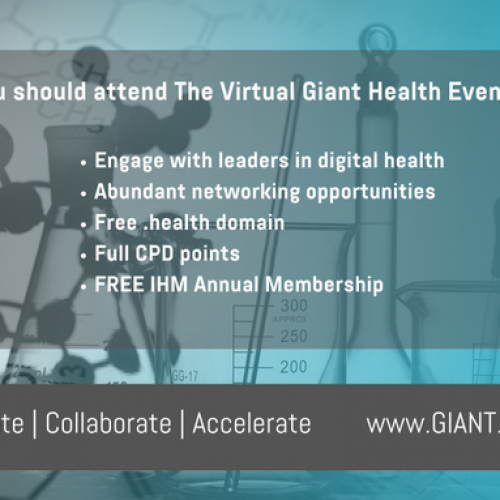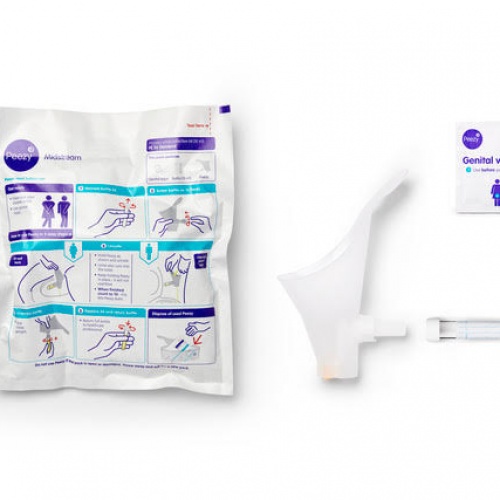Blog
Digital Health: Identifying and Patenting Digital Health Inventions
Monday 17th August 2020, 2:00pm (London UK - BST) 45mins What will the talk cover? The current pace and scale of health care innovation has led to the emergence of a broad range of new digital health technologies which…
Read more: Digital Health: I...Do you know why you should attend The Virtual Giant Health Event 2020?
Here are some reasons: Engage with leaders in digital health Abundant networking opportunities Free .health domain Full CPD points FREE IHM Annual Membership Buy ticket here.
Read more: Do you know why y...Joyance Partners is a global early-stage venture capital partnership
As the first venture fund centered on delightful moments — the small quanta of time that bring greater joy, confidence, calm, control, and absence of anxiety or pain — Joyance works actively with universities, government organizations, accelerators, angel networks, and…
Read more: Joyance Partners ...P4 Precision Medicine Accelerator opens 2021 programme applications
Powered by Barclays Eagle Labs, the P4 programme curates a unique ecosystem to support precision medicine SMEs develop research into world leading technology. Apply here. #HealthTech #MedTech #PrecisionMedicine
Read more: P4 Precision Medi...Pharma Scientist #1 Online News Portal for Pharmaceutical Sciences
Pharma Scientist specialize in providing news and events in advanced therapies, controlled substances, drug discovery and development, pharma and biopharma, logistics and manufacturing and digital health tech. Check out their website here.
Read more: Pharma Scientist ...Healthcare Needs New Skills To Build On Its COVID Inspired Digital Transformation
One of the more fascinating aspects of the coronavirus pandemic has been the speed of change in healthcare providers, such as the UK's National Health Service (NHS). For decades, the NHS has suffered under the maxim of having more pilots than British Airways, with few digital projects graduating beyond pilot stage. Yet, in the space of a month, telehealth has grown to the point that 90% of primary care appointments were being delivered virtually, with apps being developed to provide remote monitoring of people as they monitor and manage their symptoms of the virus. It's shown what can be possible when the 'burning platform' is sufficiently hot, but the digital skills of NHS staff remains an enduring challenge, not least in terms of their data literacy. The value of data in improving healthcare was perhaps best underlined by a report published a few years ago by the Richmond Group of medical charities. “Healthcare data is one of the NHS’s most precious resources. It allows individuals to be empowered in their own care, medical professionals to improve and tailor individual treatments and the system as a whole to learn and increase its understanding of what causes disease, how it can be prevented and how it should best be treated,” the report says. The parlous state of medical data has been well documented, however, whether in terms of the poor state of electronic medical records, the siloed nature of health-related data, and the poor integration of user-generated health data. Data literacy Arguably a more pressing concern, however, is the lack of fundamental data literacy among the healthcare workforce. The Data Literacy Index, published in 2018, rated healthcare as the worst performing sector in terms of data literacy of staff. “Data has the ability to unlock massive potential in the NHS, from enabling more effective population health in the community, ensuring a consistent high-standard of patient care, as well as in managing critical medical resources amid rising demand," says Jordan Morrow, Global Head of Data Literacy at Qlik. “While data is most powerful when it’s used across the organisation – from management and administration through to frontline workers – few organisations are actively investing in their employees’ ability to confidently use data." This dire conclusion was shared by a second report, from The GovLab, which bemoaned the way data literacy was holding back projects such as AI and preventative medicine. "The collection and analysis of data, when done responsibly and in a trusted manner, has the potential to improve treatment and drive towards value, both social and economic, in healthcare," the report says. "However, the goal of using data to improve the NHS and social care is hampered by a “talent gap” – a lack of personnel with data analytical skills – that stands in the way of uncovering the rich insights expected to reside in the NHS’ own data." A new report from EIT Health and McKinsey therefore offers a timely opportunity to gauge progress. The report specifically looks at how the human capital available to healthcare providers may be supporting, or undermining, progress with AI in the sector. It suggests that for the technology to achieve its full potential, not only will staff require strong data and analytics skills, but even basic digital skills will become a prerequisite. Alas, these are skills that are typically not part of the curriculum in medical training, which is leaving a generation of healthcare workers ill equipped to deal with the requirements of the modern age. "Practitioners need not only to be able to use AI solutions, but assess when they are appropriate for patients and those on the front line need to explain them to those patients," the report says. "This requires a mixture of digital literacy and critical thinking skills rather than specific qualifications in statistics – and these skills are needed across all healthcare staff." New roles As well as boosting the digital skills of traditional clinical staff, the report also highlights the likely growth in new roles across the healthcare sector, including data scientists, AI engineers and data governance experts. What the report is less clear on is how the sector will attract such personnel given the simultaneous demand for such roles across the economy, and the current shortage of experienced workers in these areas. Healthcare is not renowned for its high pay and may struggle to attract talent in these areas in sufficient volume and quality when they're fighting against organizations in finance, technology, and automotive sectors, who traditionally offer much higher packages to workers. Of course, the upskilling of healthcare workers does not merely have benefits in terms of the end use of AI-based technologies, but also raises the possibility of clinical staff being more heavily involved in the creation of the technologies in the first place. The paper revealed that among clinical staff with AI skills, over half had been involved in either the development or the deployment of an AI solution. This is important, as the paper highlights how many AI startups overlook the importance of involving healthcare professionals in the early stages of their development, which hampers adoption when changes are then required at a more advanced stage in order to cope with the realities of the operating environment. "While medical practitioners seem universally keen to be involved at all stages of developing and implementing solutions – indeed, consider it an imperative – the startup community appears less convinced," the report says. "Only 14 percent of survey respondents from AI startups felt that the input of healthcare professionals was critical in the design phase, rising to 25 percent for the testing phase." Developing the skills Last year, the NHS conducted the Topol Review, which was led by digital health pioneer Eric Topol, into the skills required for the future. The report proposes three core principles by which Topol believes the NHS’s workforce strategy should be guided in the future: Patient empowerment – with new tools enabling patients to take a more active involvement in their own care. Driven by evidence – with any introduction of new technology driven by evidence rather than hype or the latest trends so that stakeholders can trust it. Saving time – healthcare is a notoriously time-pressed environment, and so the adoption of technology should strive to return time to professionals to deliver better care. The need to change is underpinned by the fact that despite the workforce growing to its largest ever, the NHS still struggles to keep up with the demands placed on it by the growing and ageing UK population. The education of this workforce will be crucial if any kind of successful digital transformation is to be seen. “The education and training of the existing workforce, along with the preparation of an appropriate pipeline of talented future staff, will be key to the success of any programme of change designed to empower staff to take advantage of the advances in technology to improve service delivery,” Topol says. Whilst there have been some projects, such as the NHS Digital Academy, already created, these programs target a tiny proportion of the overall workforce. One of the core challenges identified in the report is the time required to train. Workers at all levels report increasing levels of stress as they struggle to cope with the growing expectations of both the public and their managers. Factoring in the requisite time to both learn new skills, and to integrate their new skills into current practice in a heavily target-driven culture is a hurdle that cannot be over-estimated. Data-driven healthcare Heather Gittings, Global Industry Director, Public Sector & Healthcare at Qlik argues that a first step is to try and engage more staff in understanding the value of data, and how it can benefit them in their work. She suggests that for many frontline workers today, the perception of data is largely a negative one. "For example, clinicians may receive data on wait time within the Emergency Department to show whether they are on target or whether they will face penalties for those patients that weren’t processed within four hours," she explains. "This analysis is therefore perceived negatively and, in turn, many frontline workers are unenthusiastic about using data that may become “another stick to beat them with”." As we've seen with the use of technology during the COVID outbreak, Gittings also believes its crucial for data to be fully embedded into the workers' existing workflow. During the pandemic, this has been supported due to the fundamental change the virus has brought to the workflow of many healthcare professionals, and it will be important to take lessons from this in the introduction of technologies in the post-pandemic healthcare environment. "This was certainly true for the University Hospitals of Morecambe Bay NHS Foundation Trust, which introduced an Analytical Command Centre, a series of large analytics dashboards based at the Royal Lancaster Infirmary site that provides frontline care workers with instant access to key information, such as the status of ambulances, surges in demand, which patients are due for discharge, as well as the current bed state across the Trust," Gittings explains. "Since its introduction, the numbers of patients triaged within 15 minutes of arrival has improved from around 65% to a position where the Trust consistently triages 95% of patients within 15 minutes of arrival at one of the Emergency Departments." There are likely to be a host of stories that emerge from healthcare during the pandemic, and while the majority of these will revolve around the true heroism of frontline staff going above and beyond the call of duty, there are also likely to be those involving the successful deployment of new technology. These can be a powerful catalyst in driving change across the institution, and help to involve people in the further design and deployment of technologies in healthcare. The pandemic has also made it crystal clear that data plays a crucial role in the decision making process in healthcare, not just in terms of understanding the number of people infected, but how their health is progressing while in isolation. This will hopefully help to drive an enduring culture of data-driven decision making across the sector. “Using data to drive decision making not only helps ensure that the insights provided are the most relevant and actionable for the frontline workers, but makes them feel part of the process," Gittings explains. "Indeed, our experience has shown that when clinicians remain part of the design process, constantly feeding into the analytics team with possible improvements or way to expand the application, they stay engaged longer and the adoption of data decision making increases because they have a stake in its success.” As the report from the Richmond Group illustrates, data has the potential to truly transform the way healthcare is delivered. It can't be done without staff across the sector improving their data literacy, however. The rapid transformation seen during the COVID pandemic illustrates the change that can be delivered, and provides an incredible base to build on in delivering the data-driven transformation of healthcare that has been long overdue.
Read more: Healthcare Needs ...Check out how Exploristics can help get clinical trials back on track after disruption due to COVID-19
Unexpected disruption to clinical trials, such as that seen in the global COVID-19 pandemic, can have a devastating impact on patients and healthcare systems and cause numerous unforeseen challenges for developers of medicines, medical diagnostics and devices. At Exploristics, they…
Read more: Check out how Exp...The GIANT Health Inbound Trade Mission goes virtual too!
What is our Inbound Trade Mission Programme? The GIANT Health Inbound Trade Mission will be held as planned and is virtual too. The Inbound Trade Mission delivers opportunities for foreign health-tech businesses to enter the UK market. We at GIANT Health still remain committed to finding new business opportunities for overseas companies outside of the U.K. We still want to encourage and support global healthcare technology and innovation. If you are interested and would still like to find out more please contact us, we would love to hear from you.
Read more: The GIANT Health ...Peezy Midstream is the only urine collection method that meets Public Health England’s UK Standards for Microbiology Investigation of Urine.
Peezy Midstream transforms essential urine screening for routine and prenatal medicine, delivering accuracy and right-first-time prescribing. See how and why in pictures, using our new infographic. Urine is one of the most important carriers of cancer biomarkers, bacteria, protein, glucose…
Read more: Peezy Midstream i...UK secures early access to promising coronavirus vaccine candidates
The UK government has secured early access to 90 million doses of promising early Covid-19 vaccine candidates, with more in the pipeline as the country looks to build a portfolio of promising new vaccines to protect the UK from coronavirus. Efforts have also been successful in securing treatments containing Covid-19- neutralising antibodies to protect those who cannot receive vaccines, such as cancer and immunocompromised patients. The announcement of these partnerships, made by Business Secretary Alok Sharma, would provide the UK with the opportunity to access enough doses to vaccinate and protect priority groups identified, such as frontline health and social care workers and those at increased health risk, in England, Scotland, Wales and Northern Ireland. The government has also launched the NHS Covid-19 vaccine research registry to aid efforts in getting access to a safe and effective vaccine. The new website will enable people in the UK to volunteer for future vaccine studies more easily, allowing members of the public to register their interest and be contacted to participate in clinical studies. In order to enable large-scale vaccine studies across the UK, the government is aiming to recruit 500,000 by October – a target considered essential in their strategy in quickly combatting coronavirus and securing an effective, viable vaccine. Clinical studies with hundreds of thousands of volunteers will help scientists and researchers better understand the effectiveness of each vaccine candidate and will considerably speed up efforts to discover a safe and workable vaccine. Business Secretary Sharma said: “The hunt to find a vaccine is a truly global endeavour and we are doing everything we can to ensure the British public get access to a safe and effective coronavirus vaccine as soon as possible. “This new partnership with some of the world’s foremost pharmaceutical and vaccine companies will ensure the UK has the best chance possible of securing a vaccine that protects those most at risk. “The public can also play their part in vaccine research through the new NHS vaccine research register. By signing up and participating in important clinical studies, together we can speed up the search for a vaccine and end the pandemic sooner.” Professor Chris Whitty, Chief Medical Officer and NIHR Head, added: “Thanks to Covid-19 patients’ willingness to take part in treatment studies, we’ve been able to identify treatments that work and ones that don’t, which has improved patient care world-wide. “Now that there are several promising vaccines on the horizon, we need to call again on the generosity of the public to help find out which potential vaccines are the most effective. “Using a new NHS website developed in partnership between the National Institute for Health Research (NIHR) and NHS Digital, people across the UK can register their interest to be approached to join a vaccine study. Please go to the website and consider volunteering.”
Read more: UK secures early ...Next Tonight @ 8 webinar on Monday - Radio Society of Great Britain
Monday, 27 July 2020 You can find out more about all the webinars here.
Read more: Next Tonight @ 8 ...Explore the whitepaper on Engaging With Regulators on Novel Statistical Approaches to Clinical Development written by Scendea and Exploristics
CURRENT CHALLENGES IN DRUG DEVELOPMENT The Pharmaceutical Industry is undergoing significant change as it faces extreme pressure to deliver new treatments to market at a time of increased spending in R&D. Multiple economic pressures are being exer ted on…
Read more: Explore the white...
 Attendees
Attendees Sponsors and
Exhibitors
Sponsors and
Exhibitors
 Webinars
Webinars
 Contact us
Contact us










